Living in Limbo: The Women of Jordan's Zaatari Refugee Camp
The conflict in Syria has raged on for three years, creating the worst humanitarian crisis of the 21st century. But from the rubble of their former homes, the women in Jordan's Zaatari refugee camp are displaying a remarkable resilience in finding ways to build new lives. Photographs by Rena Effendi
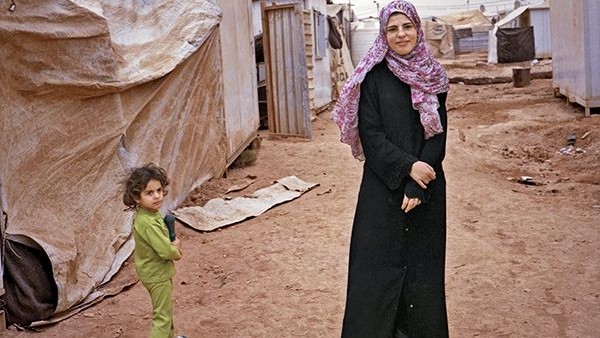
"My main hope is to return to Syria," says Aisha Hariri, 19, who works with her family making pickles.
It's a drizzly morning in Jordan's Zaatari refugee camp. A biting wind whips around the white prefabricated trailers and tents that—like most things in this flat, sprawling desert labyrinth—are covered in a gritty, sandy dust. The sound of women laughing and chatting emanates from a small, square concrete room, one of the many communal kitchens dotted throughout the camp, interspersed among the temporary homes. (Trailers aren't equipped with private kitchens or toilets, although some refugees have installed them at their own expense to avoid having to use the shared facilities.)
In contrast to the bleak chill outside, the sparse kitchen is warm, heated by five gas burners at full flame, boiling vegetables in square metal tins that serve as pots. A dozen or so women, all relatives, are crowded in the room, including Aisha Hariri, a shy 19-year-old, sitting on a cinder block in front of three colorful plastic bowls on the floor near boxes filled with produce.
The women are busy making makdous, a Syrian staple of tubular, finger-length pickled eggplants stuffed with crushed walnuts and diced chili peppers, but it's not for their own consumption. They've turned this tiny space into a veritable factory assembly line, the heart of their new family business making pickled produce to sell to other refugees in the camp. "Just because we're refugees doesn't mean we're sitting around doing nothing," Hariri says, as she tugs at the long sleeves of her loose black abaya, the ankle-length robe many Muslim women wear.
For some women, the camp, which can be dangerous and predatory, makes their plight and that of their besieged country that much worse. But even in this desolate place, many women are determined to not merely survive but attempt to carve out a life while they wait to return home.
Hariri fled her war-torn native province of Daraa, an agricultural belt just across the Jordanian border, more than a year and a half ago, along with her parents, six siblings, and most of her extended family. They left to escape the constant shelling of their village, she says, as well as the occasional military raids and harassment. Security forces twice detained Hariri's father. The family did not want to wait for a third time, so they crossed into Jordan with little more than the clothes they were wearing.
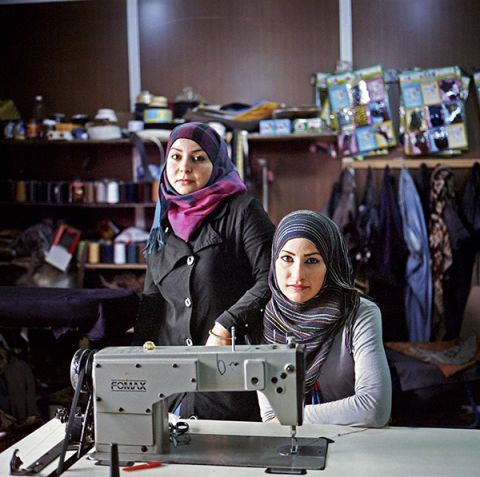
Amira Youssef, 22 (left), and Zeinab Dagher, 20, support their families by working as seamstresses, making $3 a day.
Get exclusive access to fashion and beauty trends, hot-off-the-press celebrity news, and more.
They were among the earliest residents of the Zaatari camp, which opened in northwest Jordan in July 2012 and has since ballooned into the world's second-largest camp, with more than 124,000 refugees, 54 percent of them female. (The United Nations classifies the five-camp complex in Dadaab, northern Kenya, as the world's largest. Dadaab, which is home to some 387,000 mainly Somali refugees, took two decades to reach its dismal global status. Zaatari has done so in less than two years.) The camp covers an area of about 3.5 square miles of flat, beige, arid land. It's a massive temporary metropolis a little more than 7 miles from the Syrian border that, by the numbers, is now Jordan's fourth-largest city.
The older, more established parts of the camp are generally safer because they have electricity. People know or are related to one another, unlike in the newer areas, where neighbors are strangers. Those outlying areas are much less crowded, trailers and tents are more widely spaced, and there are no streetlights, making a nighttime visit to the communal toilets, for example, a terrifying dash. There is talk of rapes and prostitution, but few cases of sexual assault are reported because most victims refuse to speak out because of the social stigma attached to sexual violence.
Zaatari is just one consequence of a hemorrhaging Syrian conflict that began in March 2011 with peaceful protests against President Bashar al-Assad and morphed into a grinding civil war that has claimed more than 120,000 lives. Nearly a third of Syria's population of about 23 million is now displaced. In the Middle East alone, some 2.3 million Syrians are scattered in neighboring states, up from 300,000 refugees in October 2012. The United Nations says an estimated 5,000 people flee the conflict every day, escaping government warplanes, attack helicopters, and artillery strikes, as well as rebel violence and increased Islamist radicalization.
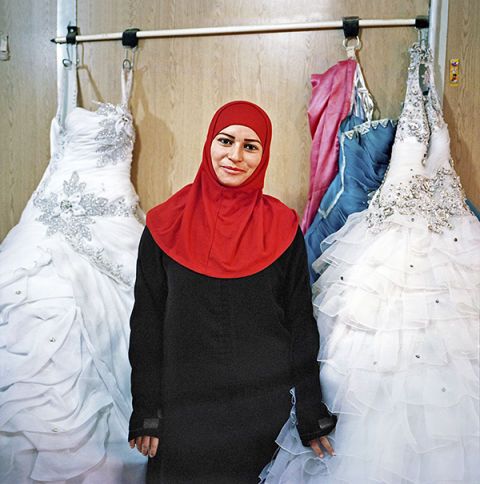
Rana Mokdad, 24, works as an assistant in a beauty salon run by a fellow refugee.
More than 90 percent of Zaatari's residents are from Daraa. Still, the camp is home to only a fraction of the more than 576,000 Syrians in Jordan. (Most refugees who come to Jordan do not want to live in the camp, with its disease and overcrowding. Those who can afford to rent apartments in cities.) The camp has certain advantages like free accommodations and utilities like electricity and water, but it's a grim place. Every refugee in the camp has a tale of loss and sorrow, of hopes dashed and others still dreamed, of hardships escaped and still endured. Many, like Hariri, are remarkably resilient and, despite the horrors they've fled, are trying to make the most of their dire situation.
Hariri attended one of the many schools in the camp, recently completing her high school degree. She wants to continue her studies and become a schoolteacher, but there are no universities in Zaatari. Instead, she spends her days learning to sew in a course offered by a nongovernmental organization (NGO) and helping the entrepreneurial women of her family make pickles. "God only knows what the future holds, but I want to learn," she says. "My main hope is to return to Syria. Every day we say, 'Maybe we can return in a few days, in a week,' but weeks have become months, and now years. It's tiring emotionally."
Like all of the refugees here, Hariri and her family don't need to work to eat. They receive free food packages of lentils, rice, and other dry staples from the United Nations, which administers the camp in tandem with the government of Jordan. The petite young woman makes a little more than $70 a month from her family's business, but it's about more than just securing spending money. "Work helps me forget a little," Hariri says. "We joke and laugh and cry and help each other out."
The women of this clan are by no means unusual in Zaatari. There are many like them who are utilizing the skills they have or learning new ones to open businesses and support their families. Some do so because they are now heading their households, either because their men are dead, imprisoned, fighting in Syria, or staying behind to protect their property or other family members. (According to the United Nations, 42 percent of Syrian refugee families in the camp are female-headed households.)

Em Ghazal, 30, in her makeshift home with her family, volunteers to match Syrians in need with NGOs that can help.
The camp's main commercial street—nicknamed Champs-Élysées by aid workers, although most Syrians simply call it "the market street"—extends for several miles. It's a testament to the determination and work ethic of many refugees who want to do more than subsist on handouts. The bustling thoroughfare is crammed with trailers that have been converted into stores selling everything from home appliances to makeup to sandwiches, as well as makeshift stalls that hawk cigarettes, candy, and other trinkets.
There are also beauty salons, including one owned by a 20-year-old woman who has been in Zaatari with her husband and 2-year-old son, Odai, for seven months. She declined to give her real name, fearing for the safety of her relatives who remain in Syria, and opted to use a nickname: Em Odai, which means "mother of Odai." "I can't sit at home," she says. "I need to work. I'm used to this. It's my profession, and I love it."
Em Odai and her family are from Syria's capital, Damascus. It took them two days to reach the Jordanian border, a perilous trek on foot and by car through multiple checkpoints, some manned by government troops, others by rebel forces. Of the four suitcases she packed, only two, containing clothes, made it to Jordan. The other two, full of hairdressing equipment, were snatched at a checkpoint.
She had her own salon in Damascus. "It was amazing, beautiful!" she says, her voice lifting. "It was called Beauty Queen." Her mood plunges dramatically when she mentions her current enterprise. "I've just called this Salon Em Odai. Boring. It's OK but nothing special."
A young woman, Hadiyee Malak, 27, sits in the salon's only styling chair in front of a rectangular mirror propped up on a small table covered with cans of hairspray, tubs of gel, and rows of nail polish. She, too, was a hairdresser back in Syria, but today she's a customer, waiting to have her eyebrows threaded. "It takes a lot of money to set a place like this up," Malak says, explaining why she isn't working.
Em Odai bought the U.N.-donated trailer for her salon on the camp's thriving black market from a family that returned to Syria. She and a business partner (also a female refugee) each paid $775 for it. They split the profits from the business, which average about $700 a month. "I see between 15 or 20 ladies a day," Em Odai says. She also rents out wedding dresses and evening gowns. Business is so good that she's just taken on an assistant, Rana Mokdad, but despite her success, Em Odai also wants to go back to Syria. "Here, there is nothing," she says. "We try and re-create some things from our past, but it can't be done. It is not the same." She pauses before wiping away her tears. "It's just that when you remember, when you think back to Syria, everything about it is better, even its air. That's enough for me—just to breathe its air again." Mokdad, a 24-year-old divorcée and mother of one, also wants to go home. "This is not our country and never will be," she says. "We will always be refugees here."
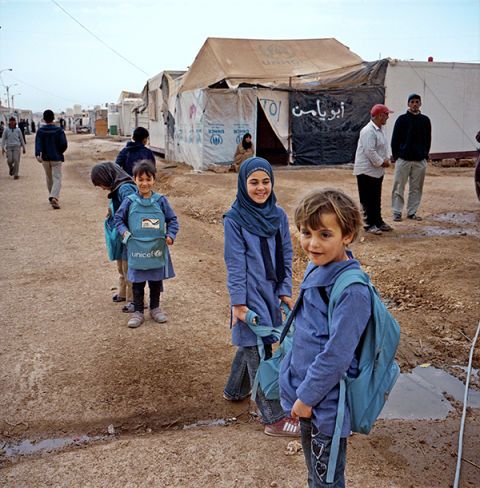
More than half of Zaatari's population is under 18. These kids, making their way home from school, are some of the 60,000 children who call the camp home.
Farther along the main street, in another store, friends Amira Youssef, 22, and Zeinab Dagher, 20, are busy at their sewing machines. They toil from 8 a.m. to 6 p.m., five days a week, for $3 a day. Youssef had enrolled in university to study history, and Dagher fled Syria before she finished high school, but both are now the breadwinners in their large families and lament the turn their lives have taken. "I didn't want to do this in my life," Dagher says. "I wanted to continue reading and studying." Her home in Daraa was shelled three days after her family of six escaped to Jordan. "I wish I brought so many things with me. I left everything behind and came here."
Dagher spent her first paycheck on a mobile phone to communicate with relatives still in Syria. Youssef reupholstered the mattresses and cushions in her family's trailer. "I was so happy," she says. "I replaced the ones we were given in the camp by the U.N. It made me feel better to see them."
In another part of the camp, Amal Hourani, 28, has just finished her morning shift at a school run by an NGO where she teaches Arabic to fourth-grade girls. She and her husband had just bought a new house in Daraa three months before the shelling began in her village. Her husband and two children headed for Jordan without her. She followed two days later and found them in a village close to the Jordanian border. The family crossed the frontier together, but the adjustment has not been easy. "I refused to carry water from the distribution point, to wait in line for food, or hand-wash clothes," Hourani says. "I made my husband do all that. I told him, 'You wanted to bring us here, so you do it. You know I don't want to be here.'"
She volunteered to teach for a month at a school, thinking that by the time that period was over, she'd be back home. Instead, the camp population kept growing, and Hourani realized she wasn't going anywhere for a while. "I said to myself, 'I will not let this situation and our circumstances get the better of me,'" she says. "'I will beat it. I will be stronger than it.'"
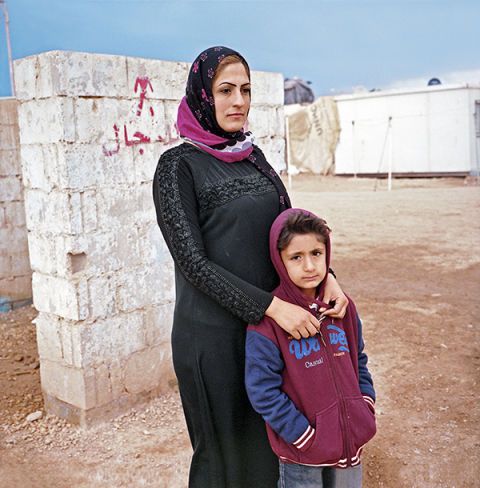
Schoolteacher Amal Hourani, 28, has vowed to not let her circumstances get the better of her.
Hourani turned her volunteer position into a paid job and now earns $310 a month. The first thing she bought with her paycheck was a washing machine. She also stopped blaming her husband for dragging her to Zaatari. "I went from being resentful to realizing that I was a part of a community here and that it was my duty to help," she says. Still, she thinks about the things she left behind and wonders what she might find when, not if, she returns. "My home was still new, we hardly lived in it," she says. "I wish I'd brought photos of my children, my family, my home, things like that. We thought we were just leaving for a few days. I even left my jewelry at home." Hourani knows she is "rejecting reality" by believing she will be able to return home soon, but she says she needs to believe it. "In my house, when we hear the news, and they start saying that there is little hope for a quick settlement, we switch off the television," she says. "We don't want to hear that."
Hourani joined a small volunteer association headed by her sister, Em Ghazal ("mother of Ghazal"), 30. The group connects refugees in the camp who need assistance—like specialized medical treatment or winter clothes for their children—with NGOs who can help.
The sisters left Syria at the same time, but unlike Hourani, Em Ghazal was eager to leave. She says she was sick of cowering in a basement, wondering how long her home would be spared from the shells she could hear thumping and crashing around her. "We left because of the destruction [caused by] the warplanes," she says. "You could hide from regular shells in a basement and try to protect yourself, but how can you protect yourself from a plane?"
Em Ghazal's husband makes enough money to care for the family, leaving her time to volunteer, but she says she'd work for free even if she were offered a paid job. "This is our cause, these are our people," she says. "If we want money for helping one another, what have we become?" Her new role has also given her a fresh perspective on her situation. "I found purpose and stopped feeling sorry for myself," she says. "Now, day after day I feel stronger. I take strength from the people around me as well." Says her sister, "We have to help each other out over here."
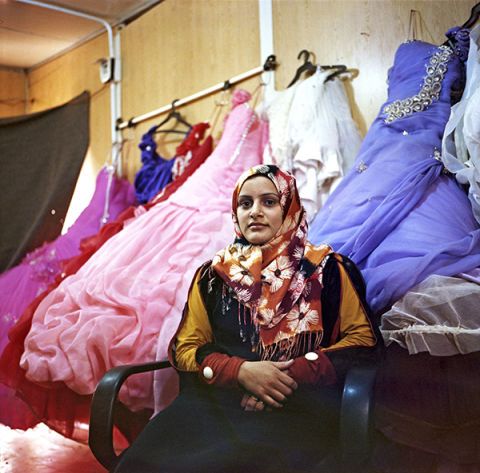
Em Odai, 20, owns a beauty salon where she styles hair and rents out wedding dresses and evening gowns.